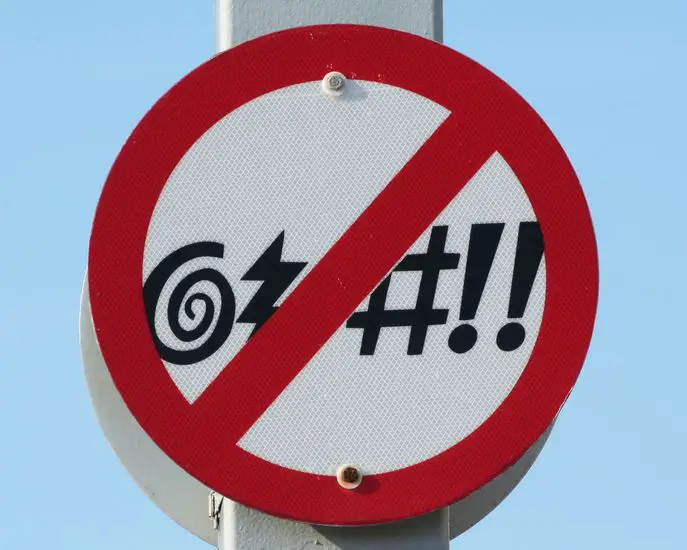Have you ever wondered what kind of strange laws exist around the world? You might be surprised to learn that some of the things you do every day could land you in trouble in other countries. Here are some of the weirdest laws in the world that you should know before you travel.
Have you ever wondered about some of the strange laws that exist around the world? Some of them may seem funny, bizarre, or even absurd, but they often have a reason behind them. In this blog post, we will explore some of the weirdest laws in the world and their origins.
It’s Illegal to Chew Gum in Singapore

Singapore is known for its cleanliness and orderliness, but did you know that chewing gum is banned there? The law was introduced in 1992 to prevent people from sticking gum on public places like subway doors, seats, and walls. The only exception is for medical or dental purposes, such as nicotine gum or sugar-free gum. If you are caught chewing gum, you could face a fine of up to $2,000 SGD (about $1,500 USD).
It’s illegal not to walk your dog at least three times a day in Turin, Italy

If you love dogs, you might want to visit Turin, Italy, where the city council passed a law in 2017 that requires dog owners to walk their pets at least three times a day. The law also prohibits owners from dyeing their dogs’ fur or keeping them in small cages. The aim is to promote animal welfare and prevent cruelty. Violators could face a fine of up to €500 (about $590 USD).
Feeding Pigeons is not allowed in Venice, Italy

Venice is famous for its canals and gondolas, but also for its pigeons. The city is home to thousands of these birds, which flock to the main square of Piazza San Marco to feed on the crumbs left by tourists. However, feeding pigeons has been illegal in Venice since 2008, as the authorities claim that they damage the historic buildings and monuments with their droppings and pose a health risk. If you are caught feeding pigeons, you could be fined up to €700 (about $830 USD).
Indian soldiers are not allowed to combat with knives except for the troops from Nagaland

India has a diverse and multicultural army, with soldiers from different regions and backgrounds. However, there is one rule that applies to all of them: they are not allowed to use knives or bayonets in combat, except for the troops from Nagaland. Nagaland is a state in northeastern India, where the Naga people have a tradition of using knives as weapons and symbols of honor. The Indian army respects this tradition and allows the Naga soldiers to carry their knives into battle.
Pregnant women in Madagascar are prohibited from wearing hats

Madagascar is an island nation off the coast of Africa, known for its unique wildlife and culture. However, it also has some unusual laws that might seem bizarre to outsiders. One of them is that pregnant women are not allowed to wear hats. The reason behind this law is that hats are believed to block the flow of energy from the ancestors to the unborn child, which could affect their health and destiny. Therefore, pregnant women must keep their heads uncovered at all times.
Kissing is prohibited on trains in France but allowed on railway stations only if it is done before the train arrives

Mostly, the locals would request lovers to use the designated area near the parking space. Taking a bus? Go for it!
France is often considered the most romantic country in the world, but it also has some strict rules when it comes to public displays of affection. One of them is that kissing is forbidden on trains, as it could cause delays and inconvenience for other passengers. The law dates back to 1910, when trains were slower and less frequent than today. However, kissing is allowed on railway stations, but only if it is done before the train arrives. There are even signs that indicate where couples can kiss without disturbing anyone.
Getting someone too drunk in Australian pubs

Australia is known for its laid-back and friendly culture, but also for its love of beer and pubs. However, there is a limit to how much alcohol you can serve or consume in Australian pubs, as getting someone too drunk is illegal. The law aims to prevent alcohol-related violence and accidents, as well as protect the health and safety of drinkers and staff. If you are caught serving or buying drinks for someone who is already intoxicated, you could face a fine of up to $11,000 AUD (about $8,200 USD) or even jail time.
It Is Illegal to Have a Purple Garage Door in Ontario

Ontario is Canada’s most populous province, with a diverse and multicultural population. However, it also has some quirky laws that might make you scratch your head. One of them is that it is illegal to have a purple garage door in Ontario. The law was passed in 2010 by a local council in Kanata Lakes, a suburb of Ottawa, after a resident painted his garage door purple without consulting his neighbors or the homeowners’ association. The council claimed that the color was too bright and clashed with the rest of the neighborhood. The resident was ordered to repaint his garage door or face a fine of up to $5,000 CAD (about $3,900 USD).
It’s illegal to let your chickens cross the road in Quitman, Georgia

This law was passed in 1998 to prevent poultry from wandering onto the streets and causing traffic accidents or damage to property. The penalty for violating this law is a fine of up to $1,000 or up to 30 days in jail.
In the UK, people are not allowed to be drunk when in charge of a cow, horse, carriage or steam engine. This law dates back to 1872 and was intended to prevent accidents and injuries caused by intoxicated people operating vehicles or animals. The punishment for breaking this law is a fine of up to £200 or up to 51 weeks in prison.
Running out of gas is illegal on the German autobahn

The autobahn is a network of high-speed highways that have no speed limit in some sections. Drivers are expected to plan their trips carefully and ensure that they have enough fuel to reach their destination. Running out of gas on the autobahn is considered a traffic obstruction and can result in a fine of up to €80 or having your license suspended for up to six months.
It’s illegal to hike naked in Switzerland, unless you wear shoes

This law was introduced in 2009 after a series of complaints from locals who were offended by the sight of nude hikers. The Swiss authorities decided to ban naked hiking, but allowed an exception for those who wear shoes, as a way of protecting their feet from injuries. The penalty for hiking naked without shoes is a fine of up to CHF 200 or a warning.
Weddings and funeral services must never be disturbed in Australia

This law is part of the Summary Offences Act 1966 and aims to protect the dignity and solemnity of these ceremonies. Anyone who willfully interrupts, disturbs or insults a wedding or a funeral service can be fined up to A$1,000 or imprisoned for up to two months.
Taking selfies with Buddha is considered an offence in Sri Lanka

This law is based on the Buddhist principle of respect for all living beings and objects of worship. Taking selfies with Buddha statues or images is seen as disrespectful and irreverent, as it implies that the person is equal or superior to Buddha. The punishment for this offence can vary from a fine to deportation or imprisonment.
It’s illegal to pass wind in a public place after 6pm on Thursdays in Florida

This law was enacted in 1971 as a response to a series of protests that involved people farting loudly in front of government buildings to express their dissatisfaction with the authorities. The law was meant to discourage such disruptive and disrespectful behavior and to maintain public order and decency.
Naming your baby something weird in Denmark

In Denmark, parents have to choose a name for their baby from a list of 7,000 approved names by the government. If they want to name their child something that is not on the list, they have to get permission from the Church Ministry. The reason for this law is to protect children from being ridiculed or discriminated because of their names and to preserve the Danish culture and language.
All Canadian radio stations are required, by law, to play Canadian artists on the airwaves at least 35 percent of the time, especially during the hours of 6 a.m. and 6 p.m., Monday through Friday

This law was introduced in 1971 as part of the Canadian Radio-television and Telecommunications Commission (CRTC) regulations to promote Canadian culture and identity and to support the local music industry.
It’s Illegal to Wear High Heels to the Acropolis, Greece

The Acropolis is one of the most ancient and iconic monuments in Greece, dating back to the 5th century BC. It is also a UNESCO World Heritage Site and a symbol of democracy and civilization. To protect this historical treasure from damage, the Greek government banned visitors from wearing high heels or any footwear that could harm the marble stones of the Acropolis.
It’s illegal to hold salmon under suspicious circumstances in England & Wales

This law is part of the Salmon Act of 1986, which regulates the fishing and selling of salmon in England and Wales. The law aims to prevent illegal fishing and poaching of salmon, which are considered a valuable and endangered species. Anyone who is caught holding a salmon in a way that suggests they obtained it unlawfully could face prosecution.
In Samoa, it’s illegal to forget your wife’s birthday

Samoa is a country in the Pacific Ocean that has a strong culture of respect and honor for women. One way of showing respect to your wife is by remembering her birthday and celebrating it with her. Forgetting your wife’s birthday is considered a sign of disrespect and negligence, and could result in a fine or even imprisonment.
Don’t Wear Your Winnie the Pooh T-Shirt in Poland & Eastern Europe

Winnie the Pooh may be a beloved character for many children and adults around the world, but not in Poland and some other Eastern European countries. The reason is that Winnie the Pooh is seen as an inappropriate and indecent representation of a bear, because he does not wear pants and has a low IQ. Some schools and playgrounds have banned Winnie the Pooh from their premises, and some politicians have even criticized him for being a bad influence on children.
Its Forbidden to Climb Trees in Oshawa, Canada

Oshawa is a city in Ontario, Canada, that has a bylaw that prohibits anyone from climbing trees on public property without permission from the city council. The bylaw was passed in 2008 as a safety measure to prevent injuries and accidents from falling off trees or damaging them. Anyone who violates this bylaw could face a fine of up to $250.
It’s against the law to have a sleeping donkey in your bathtub after 7 pm in Arizona, USA

This law dates back to 1924, when a merchant named Carl Hickman owned a donkey that he used to transport goods across town. One day, Hickman decided to let his donkey rest in his bathtub after a long day of work. However, he forgot to take him out before he went to bed. That night, a dam broke and flooded the town, causing Hickman’s bathtub to float away with his donkey inside it. The donkey was rescued by some townspeople, but Hickman was fined for causing public nuisance and endangering his animal. Since then, the law was passed to prevent such incidents from happening again.
Making International calls is a crime in North Korea

North Korea is one of the most isolated and secretive countries in the world, and its government tightly controls all forms of communication. Anyone who tries to make an international call without authorization can face severe punishment, such as imprisonment, torture, or even execution. The reason behind this law is to prevent any information from leaking out of the country and to maintain the regime’s propaganda and ideology.
You’re (especially Buddhist monks) not allowed to reincarnate without the government’s express permission

This law was enacted by China in 2007, and it applies to all Tibetan Buddhists, who believe in reincarnation as part of their spiritual practice. The law requires anyone who plans to reincarnate to submit an application to the government and follow a set of rules. The reason behind this law is to control the succession of the Dalai Lama, the spiritual leader of Tibetan Buddhism, who is seen as a threat by the Chinese government.
It is illegal for men to belly dance in Egypt. Belly dancing is a traditional form of dance that originated in Egypt and other parts of the Middle East

It is usually performed by women, but some men also practice it as a form of art or entertainment. However, in Egypt, men are not allowed to belly dance in public, as it is considered indecent and immoral. The reason behind this law is to preserve the cultural and religious values of society and to prevent any confusion or scandal.
An unwashed car in Dubai can cost you a hefty fine

Dubai is a city that prides itself on its cleanliness and luxury, and it expects its residents and visitors to follow suit. Anyone who leaves their car dirty or dusty can be fined up to 3,000 dirhams (about $800) by the municipality. The reason behind this law is to maintain the aesthetic appeal and hygiene of the city and to prevent any health or environmental issues.
You must let anyone use your toilet if they ask in Scotland

This law is part of the ancient Scottish tradition of hospitality, which obliges anyone who owns a property to offer food, drink, and shelter to anyone who asks for it. This includes letting strangers use your toilet if they knock on your door and request it. The reason behind this law is to promote kindness and generosity among people and to help those in need.
It’s a legal requirement to own a burial plot before you die in Sarpourenx, France

This law was introduced by the mayor of Sarpourenx, a small village in southwestern France, in 2008. The law prohibits anyone from dying in the village unless they have already bought a burial plot in the local cemetery. The reason behind this law is to deal with the shortage of space in the cemetery and to encourage people to plan ahead for their death.
Peeing in the ocean in Portugal is Illegal

This law was passed by the Portuguese government in 2015, and it bans anyone from urinating in the ocean or any other body of water within the country’s territory. Anyone who violates this law can face a fine of up to 500 euros (about $560) or even imprisonment. The reason behind this law is to protect the environment and the quality of water from pollution and contamination.
Men Must Wear Speedos on French Beaches

This law was enacted by some French municipalities in 2009, and it requires men to wear tight-fitting swimwear, such as speedos or briefs, when they go to the beach or public pools. Anyone who wears loose-fitting swimwear, such as shorts or board shorts, can be fined or asked to leave. The reason behind this law is to prevent any hygiene or security issues that may arise from wearing baggy clothes that can hide weapons or dirt.
It’s a legal requirement to smile at all times except at funerals or hospitals in Milan, Italy

This law was established by the city council of Milan in 2008, and it mandates everyone to smile when they are in public places, such as streets, parks, or shops. Anyone who frowns or looks gloomy can be fined up to 100 euros (about $110) or face community service. The reason behind this law is to improve the mood and happiness of the citizens and visitors and to make Milan a more welcoming and cheerful place.

